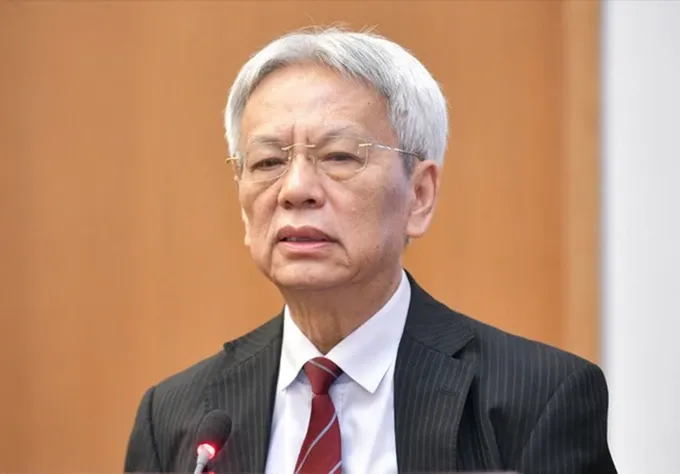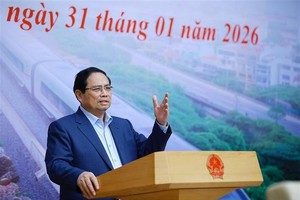
Resolution 66-NQ/TW, issued by the Politburo on April 30, 2025 on strengthening the process of law development and enforcement, has become a crucial step in meeting the demands of national development in the burgeoning new era. This necessitates a series of law amendments for the National Assembly (NA) to consider during its 9th session commencing today, as stated by Dr Nguyen Si Dung, former Deputy Chairman of the National Assembly Office.
When asked about his evaluation on the importance of Resolution 66-NQ/TW in the process to develop and then enforce laws, Dr Nguyen Si Dung affirmed the Politburo’s emphatic declaration that law development and enforcement represent “the breakthrough of breakthroughs” signifies a pivotal strategic shift in the understanding of institutional reform.
While law serves as the primary instrument for translating sound Party directives into practice, experience indicates that many significant policies encounter implementation hurdles precisely because the institutional framework lags behind. Consequently, without a vigorous overhaul of the approach to legal thinking and methodology, other reform endeavors risk being stifled.
A legal system that is transparent, actionable, and cohesive is an indispensable prerequisite for mobilizing resources, attracting investment, and guaranteeing social equity in this new era. It is therefore imperative to cultivate a modern legal environment that provides a robust foundation for sustainable growth.
The 9th session of the 15th NA, opening today, places a premium on amending and supplementing certain articles of the 2013 Constitution, along with dozens of related statutes. As a momentous step towards institutionalizing the policy of realigning administrative units and rationalizing the state machinery, these revisions must ensure the three fundamental principles.
Firstly, amendments must be rooted in a mindset of fostering developmental institutions. This goes beyond mere territorial consolidation or cutting bureaucratic layers; it must unlock new administrative capacities – leaner, more potent, and more responsive to the citizenry.
Secondly, the approach demands consistency and systemic coherence. The Constitution, laws governing organizational structures, civil servants, the budget, and so forth, must be revised in an interconnected and consistent fashion, avoiding fragmented or piecemeal adjustments.
Thirdly, paramount importance must be accorded to the phase of law enforcement. Even a streamlined apparatus will squander resources and undermine governance effectiveness if laws are ambiguous, contradictory, or difficult to implement.
In essence, this is not a routine legal revision, but a fundamental institutional reconfiguration. It necessitates a methodical, comprehensive, and forward-looking execution.
Since building a culture of compliance with the law and regularly evaluating its effectiveness post-promulgation is an issue that warrants particular attention, Dr Nguyen Si Dung stated that to realize this objective, the accountability of law-promulgating bodies must be heightened.
Each draft law should be accompanied by a substantive impact assessment report, moving beyond mere formality. Post-implementation evaluation should be institutionalized as a mandatory procedure (the NA could delegate the Law and Justice Committee or the State Audit to periodically review enacted laws).
Furthermore, a user-friendly legal ecosystem should be cultivated. Laws need to be drafted in plain language, effectively disseminated, and supported by mechanisms for legal assistance, particularly for small enterprises and vulnerable populations. The “community legal consulting” model, previously piloted in several provinces, could be expanded nationwide.
Finally, discussing the role of the 26-member Central Steering Committee on Institutional and Legal Completion in implementing Resolution 66-NQ/TW and overseeing the process of law development and enforcement, he expressed his wholehearted support, saying that this sound decision displays a powerful political resolve to actualize Resolution 66.
It reflects a serious acknowledgment that institutional reform is a collective responsibility shared by the entire political system, not something to be entirely outsourced to either the legislative or executive branch. When those who are intrinsically involved in “both formulating and executing laws” convene, it is possible to bridge the gap between political will and administrative reality, between policy and legislation.
This also represents a formidable and highly influential inter-agency coordination model. Numerous nations that have achieved success in institutional reform possess similar frameworks.
However, the Steering Committee should transcend a mere coordinating function; it needs to emerge as a hub for conceptual innovation in national institution. It should be the place where new legislative paradigms for the digital age are forged, moving beyond administrative command mindsets towards governance guided by law – characterized by transparency, efficiency, and a citizen-centric approach.
























